Half-baked news bites: Behind the latest headlines

skypicsstudio - stock.adobe.com.
Another day, another news flash. Never mind that the details may come straight from a press release designed to grab eyeballs. Are the results preliminary? Unpublished? Inconsistent with better research? Industry funded? Odds are, you’d never know it.
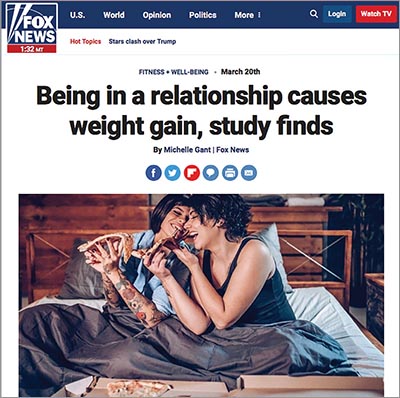
“While being in a relationship has many advantages, it turns out there’s an unhealthy downside, as well,” reported Foxnews.com in March.
“According to a new study, which analyzed over a decade’s worth of data from more than 15,000 adults, couples are more likely to gain weight than those who are single,” said Fox, citing an article in the British tabloid The Sun.
Newsweek went further. “People in relationships gain weight because they don’t care about their looks,” it declared.
Whoa. Did anyone bother to read the study?
It looked at ten phone surveys done in Australia between 2005 and 2014.1 Each was a “snapshot” in time, so it said nothing about whether people gained weight over time, or why.
Instead, the study simply found that fewer couples than singles were normal weight. Could that be because singles underestimated their weight? Did heavier people gain weight before or after becoming a couple? The study couldn’t say.
“When couples don’t need to look attractive and slim to attract a partner, they may feel more comfortable in eating more, or eating more foods high in fat and sugar,” said the study’s lead author, according to Foxnews.com.
How did that possible explanation—one of several the authors suggested—turn into a cause of weight gain?
Ask Fox and Newsweek.
Bottom Line: This study offers no good evidence that getting into a relationship leads to weight gain.
1PLoS ONE 2018. doi:10.1371/journal.pone.0192584.
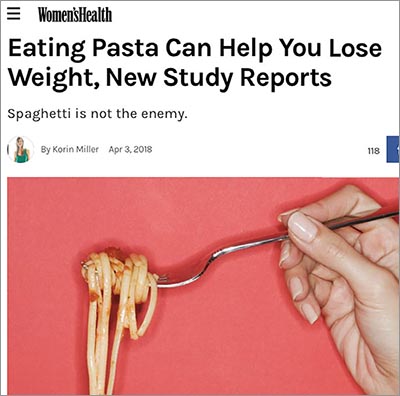
A new study published in the journal BMJ Open might change dieters’ views of pasta, reported Women’s Health in April.
“Researchers found that people actually lost weight while eating pasta,” said the magazine’s website. The “researchers analyzed 32 randomized control [sic] trials of about 2,500 people who ate a low glycemic index (GI) diet, consuming pasta instead of other forms of carbohydrates.”
(Low-GI carbs don’t cause a rapid rise in blood sugar.)
The results: “The participants ate about 3.3 servings of about a half cup of pasta on average each week. Over 12 weeks, they lost a little more than a pound on average.”
Where to begin?
First, 21 of the 32 studies had no idea how much pasta people ate.1 And the remaining 11 studies only reported how often people ate pasta, not how much. (Food labels use a one-cup serving of pasta, but many restaurants serve 3 to 4 cups in an entrée. So where did the half-cup serving come from? The press release that accompanied the study.)
Women’s Health eventually got around to explaining the biggest flaw: “The researchers point out in their conclusion that eating pasta as part of a low GI diet is likely what helped these people lose weight—not the pasta alone.” Do low-GI diets help people shed pounds? That’s debatable.
But why did the researchers even bother assessing the “effect of pasta in the context of low-glycemic index dietary patterns”? Kudos to BuzzFeed News for digging into that question: “Three of the scientists behind the study in question had financial conflicts as tangled as a bowl of spaghetti, including ties to the world’s largest pasta company, the Barilla Group.”
Bottom Line: Pasta is no magic weight-loss bullet.
1BMJ Open 2018. doi:10.1136/bmjopen-2017-019438.
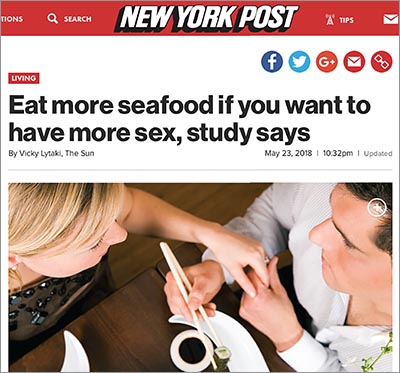
“Couples who eat at least two portions of seafood a week have more sex and get pregnant faster, a study found,” announced the New York Post in May in an article reprinted from the British tabloid The Sun.
Newsweek, the New York Times, Prevention, Reuters, and others also ran the irresistible story. But none had so few caveats.
The Post leapt straight to an explanation: “Researchers say the protein-rich food boosts men and women’s sex drive and improves the quality of their sperm and eggs.” Couples were “39 percent more likely to have sex on days when they had both eaten seafood, such as fish or oysters.”
But when only the man or woman ate seafood, they were no more likely to have sex than when neither did.1 If seafood were such a strong aphrodisiac, wouldn’t you expect some uptick in odds if only one person had, say, a tuna sandwich?
Of the 501 couples—all trying to conceive—“92 percent of the frequent seafood eaters had gotten pregnant within one year,” noted the Post. “But only 79 percent of the other group had conceived.” (“Frequent” meant at least eight servings per month.)
Yes, but could something other than the seafood have been responsible?
“Individuals with higher seafood intake could have healthier diets overall, which we were unable to account for in the present study,” wrote the researchers.
“Couples who consume greater amounts of seafood together may share more meals and thus more time together (including nights), which might explain the association between sexual activity and subsequently fecundity,” they cautioned.
Neither factor would fully explain the links, said the scientists. And they cited other evidence that seafood or its omega-3 fats boosts fertility. But at least they acknowledged uncertainties. Not the Post.
Bottom Line: Aim for two or three servings of seafood a week to protect your heart. Pick low-mercury fish like salmon or sardines, especially if you’re pregnant or trying to be.
1J. Clin. Endocrinol. Metab. 103: 2680, 2018.

"Dark chocolate with high concentrations of cacao can have positive effects on stress levels, inflammation, mood, memory and immunity, according to two new studies,” reported USA Today in April.
Wow. What doesn’t dark chocolate do?
Real Simple magazine went further. “People who eat more chocolate are less stressed, according to science,” it declared.
The participants in the two studies—led by Lee Berk of Loma Linda University—ate 48 grams of dark chocolate a day.1,2 (A Hershey’s Special Dark bar weighs 41 grams...and has 200 calories.)
“Blood tests revealed the chocolate influenced gene activity, increased anti-inflammatory agents and increased infection-fighting cells, Berk said,” reported USA Today. “Gamma waves recorded by an electroencephalogram (EEG) suggested the treat could positively impact brain function, such as cognitive function and creativity, even two hours after eating it.”
So the study never measured stress, inflammation, mood, memory, or immunity—just brain waves and gene activity.
USA Today did get around to noting that “the two studies included a total of 10 participants and results have not yet been published in a peer-reviewed journal for scrutiny.”
Yup. One study had just five people and no control group (people who got no chocolate). The other had four people who got chocolate and one control (who got none).
How did two unpublished pilot studies make headlines? Loma Linda’s glowing news release had to help.
Oh, yeah. The test chocolate was made by Parliament Chocolate, which is co-owned by Lee Berk’s son Ryan. Sheesh.
Bottom Line: A large clinical trial (COSMOS) is testing a supplement with cocoa flavanols (600 milligrams a day) on heart disease, stroke, and memory. Even if it helps, you’d have to eat some 600 calories’ worth of dark chocolate a day to get that much.
1fasebj.org/doi/10.1096/fasebj.2018.32.1_supplement.878.10.
2fasebj.org/doi/10.1096/fasebj.2018.32.1_supplement.755.1.
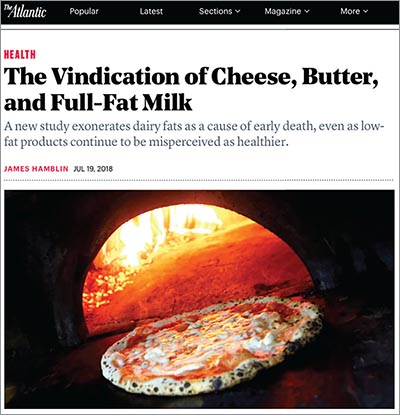
“A new study exonerates dairy fats as a cause of early death, even as low-fat products continue to be misperceived as healthier,” The Atlantic reported in July.
“An analysis of 2,907 adults found that people with higher and lower levels of dairy fats in their blood had the same rate of death during a 22-year period. The implication is that it didn’t matter if people drank whole or skim or 2-percent milk, ate butter versus margarine, etc.”
Since when is an “implication” enough to “exonerate” anything?
For starters, this kind of study can’t prove cause and effect.
It looked for a link between dairy fats in blood and the risk of heart disease, stroke, or death.1 But it couldn’t rule out the possibility that people with lower dairy fat levels were different from those with higher levels.
For example, people with lower levels drank more alcohol, had bigger waists, and were more likely to have type 2 diabetes and be treated for high blood pressure. The authors accounted for those differences, but they couldn’t account for differences they didn’t know about.
One example: Were people who were eating more dairy more likely to start taking statins to lower their cholesterol over the 22-year study? The authors didn’t say.
Another key question: Were people with lower dairy-fat levels eating less dairy and more chips, pretzels, soda, cookies, cupcakes, or other sweets or white flour? The authors didn’t say.
The lead investigator “believes that this evidence is not itself a reason to eat more or less dairy,” noted The Atlantic. “But she said it could encourage people to give priority to whole-fat dairy products over those that may be lower in fat but higher in sugar, which may be added to make up for a lack of taste or texture.”
Tip: Low-fat dairy doesn’t necessarily have more sugar than high-fat. There’s plenty to choose from (see “Culture Wars”).
Bottom Line: Replacing saturated fats (like those in dairy and meat) with unsaturated fats (like those in nuts, fatty fish, and most oils) lowers the risk of heart disease. And that’s based on numerous studies, including randomized clinical trials.2,3
1Am. J. Clin. Nutr. 2018. doi:10.1093/ajcn/nqy117.
2Cochrane Database Syst. Rev. 2015. doi:10.1002/14651858.CD011737.
3Heart 101: 1938, 2015.
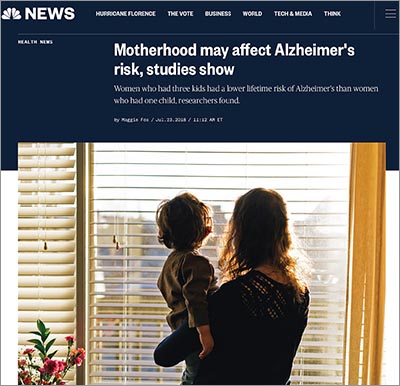
“Women who had three or more children were less likely to develop dementia than women who had only one child, [researchers] found,” reported NBC News in July.
“And women who had miscarriages were more likely to develop dementia as well.”
Holy cow!
The findings were presented at the annual Alzheimer’s Association conference in Chicago.1 The study hasn’t been published, but that didn’t stop NBC from speculating on what could explain the links.
“It could be hormones,” Heather Snyder, senior director of medical and scientific operations at the Alzheimer’s Association, told the network.
“Or you can think about women with three children. They are multitasking a lot.”
“That could build up what are called brain reserves,” explained NBC.
Hmm... Does Snyder have data showing that a woman’s number of children is a proxy for multitasking?
“Or it could have something to do with the immune system, which changes during pregnancy, or even the way a woman eats when she is pregnant,” said NBC, which never pointed out that something else about women who have three or more children could explain their lower risk.
And only later in the story did NBC report the difference in risk: 12 percent lower for women who had at least three children and 9 percent higher for each miscarriage. Not huge.
Want to know if women who had two children had a lower risk than those who had one? (Answer: No.) NBC didn’t say.
But the report didn’t stop there. “It might not be that having more children is better, however,” said the network. “Last week, a team in South Korea found that women who had five or more children had a higher risk of Alzheimer’s.”
Oh, for heaven’s sake.
Bottom Line: It’s too early to know if pregnancies or miscarriages affect a woman’s risk of dementia.
1alz.org/aaic/downloads2018/Mon-am-briefing-women-dementia-risk.pdf.

“Eat dinner earlier, dodge cancer?” ran the ABC News headline in July.
“In a new study published in The International Journal of Cancer, researchers noted that late night eating is associated with multiple different poor health outcomes, including cancer risk.” Yikes.
“Men who report eating dinner at least two hours before going to sleep had a 26 percent decrease in prostate cancer compared to those eating immediately before bed,” said ABC.
“Women with the same dining pattern had a 16 percent decrease in breast cancer.”
But how many Americans swallow that last bite and jump right into their jammies? And even if you do, ABC neglected to mention that the 16 percent lower risk of breast cancer wasn’t statistically significant—so the risk wasn’t necessarily lower.1
“People who had dinner before 9:00 p.m. had a 25 percent decrease in prostate cancer and a 15 percent decrease in breast cancer compared to people who had dinner after 10:00 p.m.,” noted ABC.
Those differences weren’t statistically significant either.
What’s more, something else about the late diners could explain their higher risk. That’s especially true in this kind of study, which asked people with or without cancer how soon after dinner they went to bed years earlier.
Maybe current fatigue or depression made cancer patients more likely to recall hitting the sack earlier.
Bottom Line: Until we know more, don’t worry that late dinners cause cancer.
1Int. J. Cancer 2018. doi:10.1002/ijc.31649.
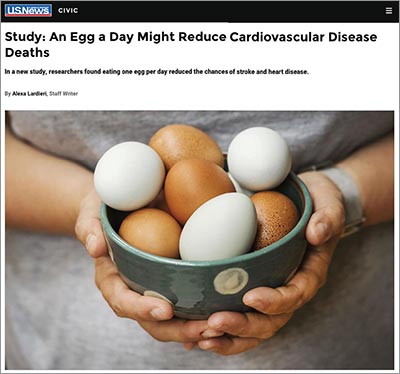
“An egg a day may be the key to preventing cardiovascular disease in adults, a study of almost half a million people suggests,” reported U.S. News in May.
“The study published Monday in the journal Heart found people who ate one egg per day were 18 percent less likely to die from cardiovascular disease, compared to adults who did not consume eggs.”
(Since when is something linked to a modest 18 percent lower risk “the key” to preventing any disease?)
Too bad U.S. News didn’t mention that the study was done in China, where people eat fewer animal foods (eggs, meat, and dairy) than we do.1 (Only 13 percent of the participants ate an egg a day.)
CNN was better at explaining the study’s limitations.
“The research team collected only ‘crude information’ about egg consumption from participants,” it noted.
“We should [also] be cautious when interpreting our results in a context of different dietary and lifestyle characteristics from China,” said Canqing Yu, associate professor in the Peking University School of Public Health and study co-author, according to CNN.
In fact, the Chinese study found no lower risk of heart disease among egg eaters who were obese, which applies to more than a third of American adults.
One more problem: In earlier studies, egg eaters with diabetes had a higher risk of heart disease. The Chinese study excluded people with diabetes.
Could something else about those who ate no eggs explain their higher risk? This kind of study can’t say.
Bottom Line: Stick to no more than four or five egg yolks a week (see June 2015, “Unscrambling Eggs”).
1Heart 2018. doi:10.1136/heartjnl-2017-312651.
Illustration: skypicsstudio/stock.adobe.com.

